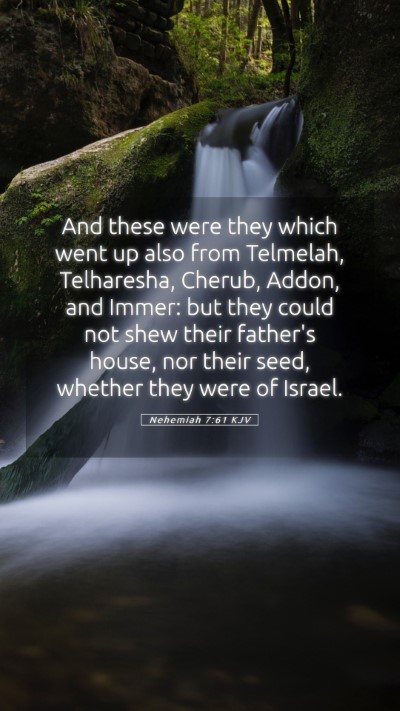Understanding Nehemiah 7:61
Bible Verse: Nehemiah 7:61
This verse, found in the book of Nehemiah, is often considered during Bible study groups for its insights into the reconstruction of Jerusalem and the repopulation of the city after the Babylonian exile.
Key Insights from Public Domain Commentaries
Nehemiah 7:61 states, "And these were they which went up from Tel Melah, Tel Harsha, Cherub, Addon, and Immer: but they could not shew their father's house, and their seed, whether they were of Israel." This verse holds significant importance as it addresses the genealogical records vital for establishing identity among the returning exiles.
Matthew Henry's Commentary
Matthew Henry highlights the importance of identifying the ancestry of returning Israelites as a means of establishing their rightful place in the community. The focus on genealogy reflects God's order and the preservation of His covenant people. Henry suggests that the inability to trace their lineage renders these individuals without a heritage in Israel, emphasizing the significance of heritage in God's redemptive plan.
Albert Barnes' Commentary
Albert Barnes expands upon the theme of identity in his commentary, noting that the returnees’ inability to prove their lineages posed a challenge to their acceptance within the community. He remarks that such genealogical verification was crucial for the religious and social structure of Israel and that those who failed to identify their ancestry faced potential exclusion. He also connects this with the importance of belonging to God’s people, as laid out in the Law.
Adam Clarke's Commentary
Adam Clarke provides a detailed analysis of the names mentioned, indicating their geographical and historical significance. He notes that Tel Melah and Tel Harsha may have been places where some of the exiles lived prior to returning to Jerusalem. Clarke emphasizes that spiritual heritage is as significant as physical lineage, suggesting that God's grace allows for inclusion among His people regardless of genetic ties.
Spiritual and Theological Implications
- Genealogy and Identity: The verse reflects how genealogies function in God’s redemptive history, underlining that identity in Christ transcends biological lineage.
- Exclusion and Inclusion: The challenges faced by those who could not establish their lineage remind us of the importance of belonging within the faith community.
- Historical Context: Understanding the historical backdrop of exile and return provides depth to the Scriptures, allowing for more profound Bible study insights.
Cross-References
- Ezra 2:59-62: Discusses the returnees who could not prove their genealogy.
- Ezra 6:7: Addresses the rebuilding efforts and the roles of different groups in restoration.
- 1 Chronicles 5:23: Provides a view on the genealogies and the significance of heritage in Israel.
Application of Nehemiah 7:61
Understanding Nehemiah 7:61 can help us reflect on our own identities as members of God’s family. Just as the exiles sought restoration, we too seek fulfillment in our relationship with God and His church. It raises questions about how we might approach inclusivity within our communities, ensuring that everyone feels their identity is found in Christ, irrespective of their background.
Conclusion
Nehemiah 7:61 serves as a reminder of the divine order in addressing identity and belonging among God’s people. Engaging with this verse within your Bible study groups or online Bible study can lead to rich discussions regarding the understanding of Scripture, particularly when dealing with themes of genealogy, inclusion, and the extension of God’s covenant to all believers.


